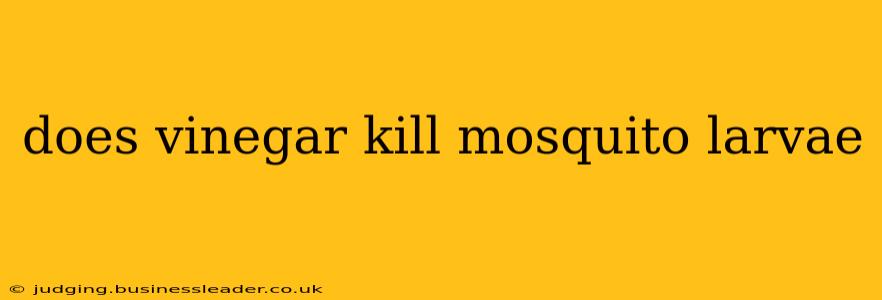Does Vinegar Kill Mosquito Larvae? A Deep Dive into Mosquito Control
Mosquitoes are a persistent nuisance, and their larvae are a significant part of the problem. Many natural pest control methods are explored, and vinegar is often touted as a potential solution. But does vinegar actually kill mosquito larvae? The answer is more nuanced than a simple yes or no.
While vinegar isn't a highly effective mosquito larvicide on its own, it can play a supporting role in a comprehensive mosquito control strategy. Let's explore this further.
What is the Effect of Vinegar on Mosquito Larvae?
Vinegar's acidity (acetic acid) can indeed harm some insects. However, mosquito larvae are surprisingly tolerant to relatively low concentrations of acetic acid. Simply pouring vinegar into standing water where mosquito larvae reside is unlikely to result in a significant kill rate. The larvae may experience some discomfort or minor mortality, but it's not a reliable method for eliminating them.
What are Some More Effective Methods to Kill Mosquito Larvae?
Several methods are far more effective than using vinegar alone for eliminating mosquito larvae:
-
Bacillus thuringiensis israelensis (Bti): This bacterium produces toxins specifically targeting mosquito larvae without harming other aquatic life. It's widely available as a commercial product and is considered a safe and effective biological control agent.
-
Removing Standing Water: This is the most crucial step. Mosquitoes breed in stagnant water. Eliminating breeding grounds by emptying containers, cleaning gutters, and maintaining proper drainage prevents larvae from even developing.
-
Mosquito Dunks: These donut-shaped tablets contain Bti and are designed to be placed in standing water. They slowly release the bacteria over several weeks, continuously controlling larvae populations.
-
Fish: Certain types of fish, such as Gambusia affinis (mosquitofish), are natural predators of mosquito larvae and can be introduced into ponds or other larger water bodies to help control populations. However, it's crucial to research the suitability of introducing fish to your specific environment to avoid any negative ecological impacts.
Can Vinegar Be Used in Combination with Other Methods?
While vinegar alone isn't a reliable mosquito larvicide, it could be used in conjunction with other methods. For instance, a slightly acidic environment might make it slightly easier for Bti to work, but this is not conclusively proven and shouldn't be relied upon. The focus should be on removing breeding grounds and using proven larvicides.
Does Vinegar Repel Adult Mosquitoes?
Vinegar's effectiveness in repelling adult mosquitoes is also limited. While the strong smell might temporarily deter some mosquitoes, it's not a reliable repellent. Commercial repellents containing DEET or picaridin are far more effective.
Is Vinegar Harmful to Other Aquatic Life?
While vinegar's acidity isn't as harsh as some chemicals, pouring large quantities into water bodies can still disrupt the delicate balance of the ecosystem. It's best to avoid using vinegar in any situation where it could significantly alter the water's pH.
In conclusion, while vinegar might have a minor impact on mosquito larvae, it's not a practical or effective method for controlling mosquito populations. Focusing on eliminating standing water and using proven larvicides like Bti or mosquito dunks offers far better results and is a much more environmentally sound approach. Remember to always consult local resources for the best mosquito control strategies in your area.
